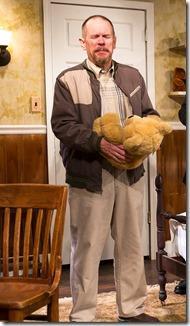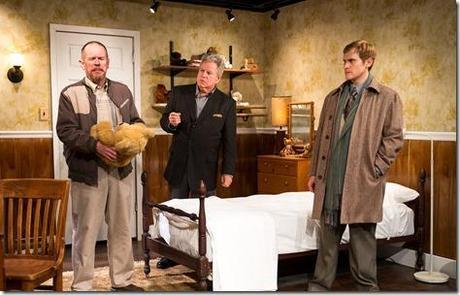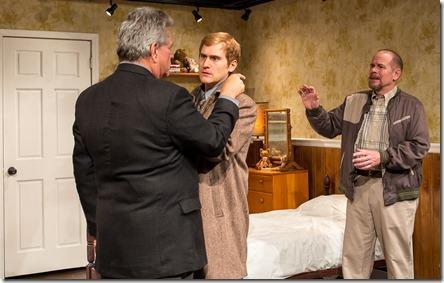
Haunting Julia
Written by Sir Alan Ayckbourn
Directed by Kevin Hagan
at Athenaeum Theatre, 2936 N. Southport (map)
thru Dec 8 | tickets: $18-$28 | more info
Check for half-price tickets
Read review
Ayckbourn’s life-affirming ghost story is effective and poignant

Eclipse Theatre presents
Haunting Julia
Review by Patrick Dyer
Sir Alan Ayckbourn has had a very diverse career as a playwright. When he first started out in the 1960s and 1970s, his plays like The Norman Conquests and Absent Friends were of the “social realism” type: multiple characters of the upper middle class of England dealing with upper middle class issues as they interacted with each other. Then, in the 1980s and 1990s, he started being a bit more experimental with style and storytelling: Woman in Mind was about a woman’s psychological problems after suffering a concussion, and Communicating Doors was a time-traveling thriller about a prostitute trying not to be murdered. Here, with Eclipse Theatre Company’s production of Haunting Julia, he explores the theme of grief and how it can make us so vulnerable, with hints of the supernatural. And for the most part, he succeeds admirably, and Eclipse Theatre brings the poignancy and raw emotion of the play front and center.
Haunting Julia is set in a heritage museum built by Joe Lukin (Norman Woodel) dedicated to his daughter Julia, a musical genius (aka “Little Miss Mozart”) who had committed suicide 12 years earlier, at the age of nineteen. The play takes place in one specific exhibit: a recreation of Julia’s college dorm room. Andy Rollinson (JP Pierson), an ex-boyfriend of Julia’s, visits the exhibit for the first time and meets with Joe who believes Julia is trying to contact him from beyond the grave. Andy, a non-religious person himself, tries to convince Joe that he’s only acting this way because he’s in an emotionally vulnerable state. However, Joe is unconvinced and has hired a local psychic named Ken (Ted Hoerl) to help him contact his daughter. This leads to each of the men’s relationship with the deceased musician being revealed as the supernatural elements of the play build into a powerful climax.

Much like Communicating Doors, the premise of Haunting Julia is challenging – especially for a writer known for his “social realism” – but Ayckbourn pulls it off with his usual keen wit and exploration of the pain of the everyman. Grief is a tricky subject itself to tackle, but he never makes the characters seem foolish with their rash decisions or outbursts at each other. Ayckbourn shows us the potency of grief and how it can make anyone vulnerable to the point of irrational behavior. The supernatural elements are rightfully ambiguous and only arrive at certain spots, allowing us to fully question whether or not Joe is right in thinking his daughter might actually be back from the grave. Each character is well rounded, making their pain all the more effective and poignant. Joe, despite depending on a psychic to talk with his deceased daughter, is still intelligent and well spoken. Andy may not be a religious person himself, but he’s still susceptible to the raw emotion Joe expresses when he believes he’s confronting Julia’s ghost. Ken the psychic states early on that he’s not interested in this job for the money but rather to achieve a “peace of mind.” (How many psychics can admit to that?)
The script isn’t without fault, though: Ken’s role in the play overall is not quite as fleshed out as Joe’s or Andy’s, and his relationship with Julia can be a bit of a stretch. Despite that, Haunting Julia still has some of Sir Ayckbourn’s best writing. Andy’s monologue about how he was the one to find Julia after her suicide and his overall relationship with her is the most gut-wrenching moment in the play and one of Ayckbourn’s most beautifully written. Julia herself, though never onstage, feels just as authentic as the others. Ayckbourn allows the three men to share their very different experiences with Julia making her as fleshed out as possible, a testament to Ayckbourn’s keen eye for character. The ending also packs quite a punch, thanks to the unique technical requirements and the talented cast.
The three men in this production bring out the play’s poignancy and wit with their authentic interactions and raw emotion. Woodel effectively captures Joe’s intellect and private pain, making his grief all the more painful and potent. Pierson is dynamic as Andy, making his character’s shifts in behavior all the more genuine, and of course he just sells that monologue towards the end about Julia. Hoerl sped through some of his lines at the performance I attended, but he still makes Ken into probably the most sympathetic psychic you’ll ever experience. Director and Set Designer Kevin Hagan guides the actors through his intimate yet meticulous scenery by maintaining respect for Ayckbourn’s words and characters. (That’s probably why Eclipse Theatre Company is always a recommended group to begin with: they never lose sight of the author’s intent.)
Eclipse Theatre Company has had a successful season with Sir Ayckbourn’s work, and they finish strong with Haunting Julia. It’s a ghost story that ironically reaffirms life for the living with wit and humor while never shying away from the pain caused by death and grief. I look forward to their upcoming season, when they will tackle the plays of Lynne Nottage. If I have the chance, I’ll be sure to attend as soon as I can.
Rating: ★★★½
Haunting Julia continues through December 8th at Athenaeum Theatre, 2936 N. Southport (map), with performances Thursdays-Saturdays at 7:30pm, Sundays 2pm. Tickets are $18-$28, and are available by phone (773-935-6875) or online through OvationTix.com (check for half-price tickets at Goldstar.com). More information at EclipseTheatre.com. (Running time: 1 hour 30 minutes, NO intermission)
Photos by Sue O’Malley. Video by Thunderlab.
artists
cast
Norman Woodel (Joe), JP Pierson (Andy), Ted Hoerl (Ken)
behind the scenes
Kevin Hagan (director, set design), JP Pierson (casting director), Kevin Scott, Nathaniel Swift (co-producers), Hilary Surface (stage manager), Jacob Roush (assistant stage manager), Joel Ebarb (costumes), Vivian Knouse (props), Michael Kunc (sound), Michael C. Smith (lighting), Thunderlab (video production), Sue O’Malley (photos)
13-1108

